University Mental Health Care: Social Skills in Mental Health Report
VerifiedAdded on 2022/11/16
|8
|1719
|284
Report
AI Summary
This report provides a comprehensive analysis of social skills within the context of mental health care. It begins with a bio-psychosocial assessment of a case study involving an individual facing challenges related to trauma, anxiety, depression, and bipolar disorder, highlighting the interplay of biological, social, cultural, and psychological factors. The assessment emphasizes the importance of understanding these factors to develop effective treatment plans. The report then delves into treatment planning, considering the patient's needs and potential risk factors, followed by a discussion of focused strategy planning. The primary therapeutic approach discussed is interpersonal therapy, which aims to improve the patient's interpersonal relationships and social functioning. The report also explores alternative treatment plans, including cognitive behavioral therapy (CBT), mindfulness techniques, and lifestyle modifications. The report underscores the significance of addressing social isolation, stigma, and cultural factors in mental health treatment, providing a well-rounded approach to patient care.
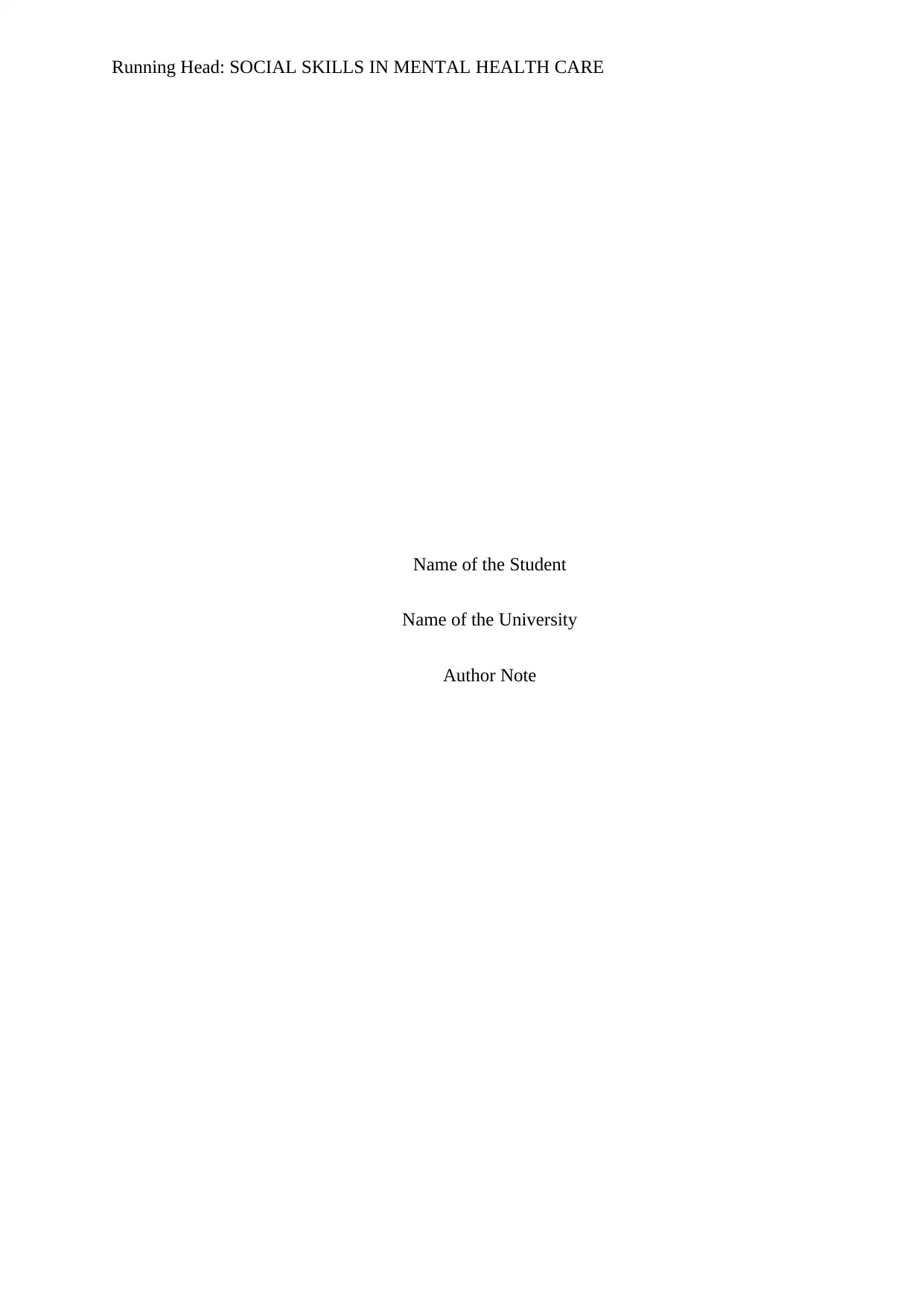
Running Head: SOCIAL SKILLS IN MENTAL HEALTH CARE
Name of the Student
Name of the University
Author Note
Name of the Student
Name of the University
Author Note
Paraphrase This Document
Need a fresh take? Get an instant paraphrase of this document with our AI Paraphraser
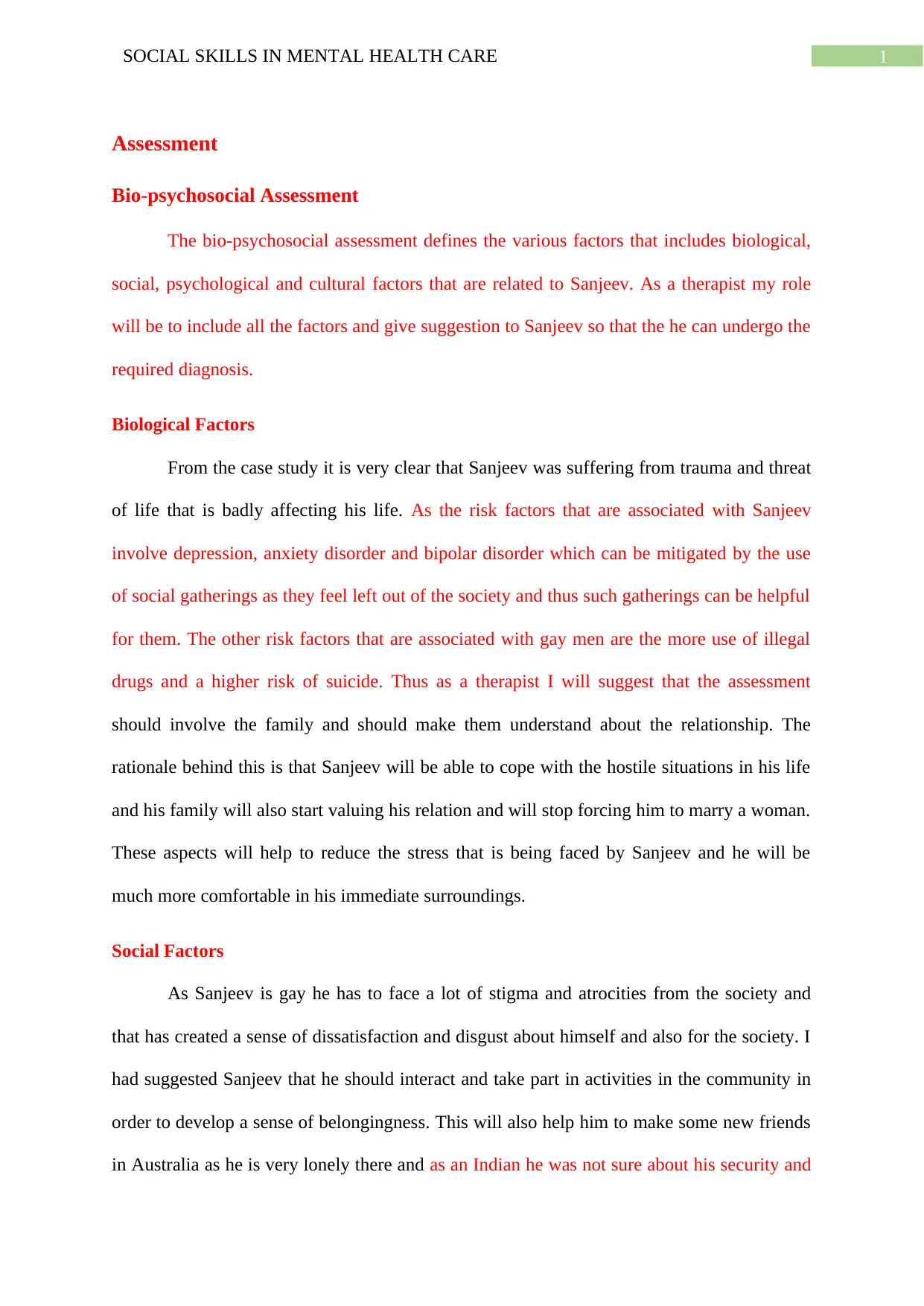
1SOCIAL SKILLS IN MENTAL HEALTH CARE
Assessment
Bio-psychosocial Assessment
The bio-psychosocial assessment defines the various factors that includes biological,
social, psychological and cultural factors that are related to Sanjeev. As a therapist my role
will be to include all the factors and give suggestion to Sanjeev so that the he can undergo the
required diagnosis.
Biological Factors
From the case study it is very clear that Sanjeev was suffering from trauma and threat
of life that is badly affecting his life. As the risk factors that are associated with Sanjeev
involve depression, anxiety disorder and bipolar disorder which can be mitigated by the use
of social gatherings as they feel left out of the society and thus such gatherings can be helpful
for them. The other risk factors that are associated with gay men are the more use of illegal
drugs and a higher risk of suicide. Thus as a therapist I will suggest that the assessment
should involve the family and should make them understand about the relationship. The
rationale behind this is that Sanjeev will be able to cope with the hostile situations in his life
and his family will also start valuing his relation and will stop forcing him to marry a woman.
These aspects will help to reduce the stress that is being faced by Sanjeev and he will be
much more comfortable in his immediate surroundings.
Social Factors
As Sanjeev is gay he has to face a lot of stigma and atrocities from the society and
that has created a sense of dissatisfaction and disgust about himself and also for the society. I
had suggested Sanjeev that he should interact and take part in activities in the community in
order to develop a sense of belongingness. This will also help him to make some new friends
in Australia as he is very lonely there and as an Indian he was not sure about his security and
Assessment
Bio-psychosocial Assessment
The bio-psychosocial assessment defines the various factors that includes biological,
social, psychological and cultural factors that are related to Sanjeev. As a therapist my role
will be to include all the factors and give suggestion to Sanjeev so that the he can undergo the
required diagnosis.
Biological Factors
From the case study it is very clear that Sanjeev was suffering from trauma and threat
of life that is badly affecting his life. As the risk factors that are associated with Sanjeev
involve depression, anxiety disorder and bipolar disorder which can be mitigated by the use
of social gatherings as they feel left out of the society and thus such gatherings can be helpful
for them. The other risk factors that are associated with gay men are the more use of illegal
drugs and a higher risk of suicide. Thus as a therapist I will suggest that the assessment
should involve the family and should make them understand about the relationship. The
rationale behind this is that Sanjeev will be able to cope with the hostile situations in his life
and his family will also start valuing his relation and will stop forcing him to marry a woman.
These aspects will help to reduce the stress that is being faced by Sanjeev and he will be
much more comfortable in his immediate surroundings.
Social Factors
As Sanjeev is gay he has to face a lot of stigma and atrocities from the society and
that has created a sense of dissatisfaction and disgust about himself and also for the society. I
had suggested Sanjeev that he should interact and take part in activities in the community in
order to develop a sense of belongingness. This will also help him to make some new friends
in Australia as he is very lonely there and as an Indian he was not sure about his security and
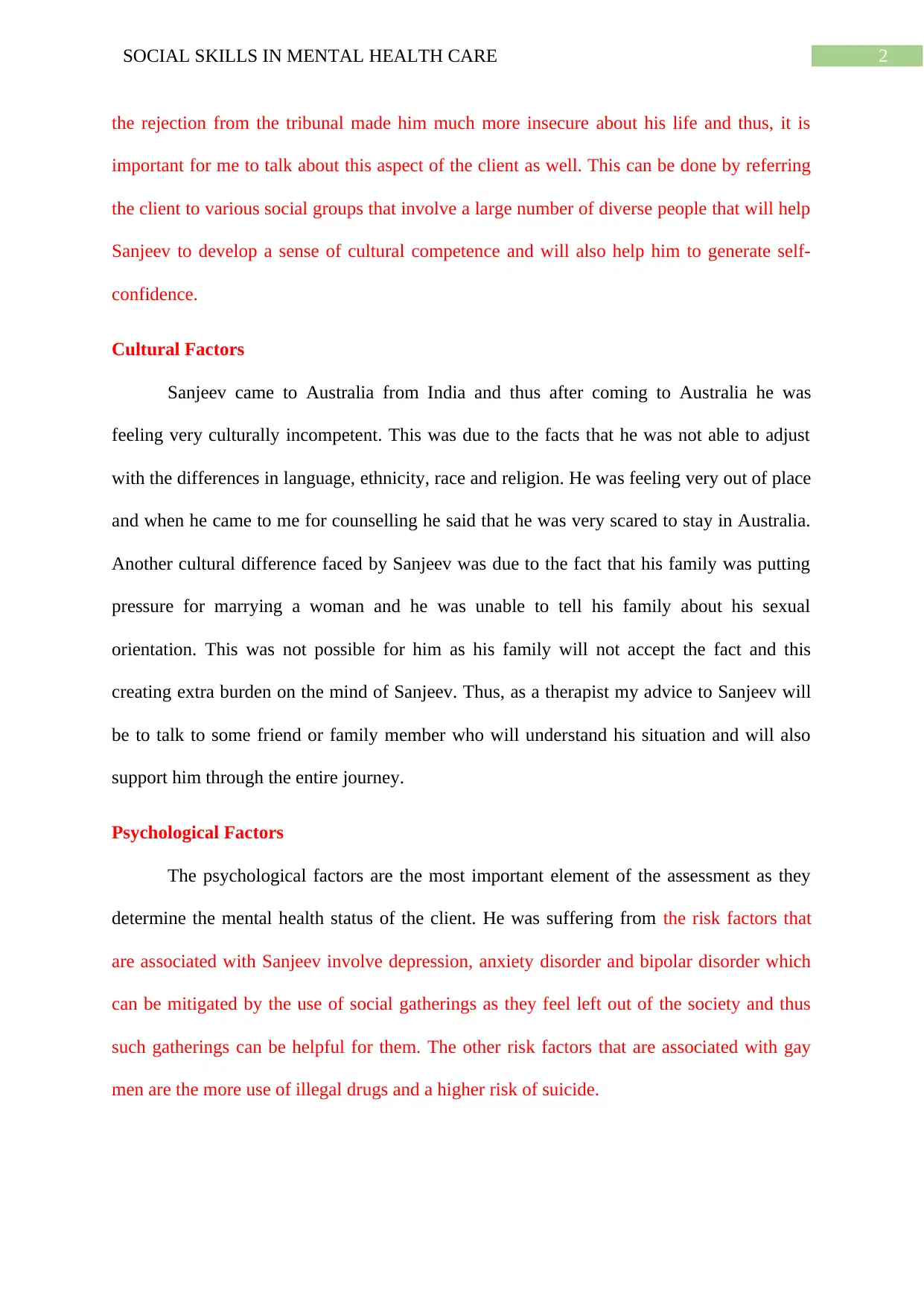
2SOCIAL SKILLS IN MENTAL HEALTH CARE
the rejection from the tribunal made him much more insecure about his life and thus, it is
important for me to talk about this aspect of the client as well. This can be done by referring
the client to various social groups that involve a large number of diverse people that will help
Sanjeev to develop a sense of cultural competence and will also help him to generate self-
confidence.
Cultural Factors
Sanjeev came to Australia from India and thus after coming to Australia he was
feeling very culturally incompetent. This was due to the facts that he was not able to adjust
with the differences in language, ethnicity, race and religion. He was feeling very out of place
and when he came to me for counselling he said that he was very scared to stay in Australia.
Another cultural difference faced by Sanjeev was due to the fact that his family was putting
pressure for marrying a woman and he was unable to tell his family about his sexual
orientation. This was not possible for him as his family will not accept the fact and this
creating extra burden on the mind of Sanjeev. Thus, as a therapist my advice to Sanjeev will
be to talk to some friend or family member who will understand his situation and will also
support him through the entire journey.
Psychological Factors
The psychological factors are the most important element of the assessment as they
determine the mental health status of the client. He was suffering from the risk factors that
are associated with Sanjeev involve depression, anxiety disorder and bipolar disorder which
can be mitigated by the use of social gatherings as they feel left out of the society and thus
such gatherings can be helpful for them. The other risk factors that are associated with gay
men are the more use of illegal drugs and a higher risk of suicide.
the rejection from the tribunal made him much more insecure about his life and thus, it is
important for me to talk about this aspect of the client as well. This can be done by referring
the client to various social groups that involve a large number of diverse people that will help
Sanjeev to develop a sense of cultural competence and will also help him to generate self-
confidence.
Cultural Factors
Sanjeev came to Australia from India and thus after coming to Australia he was
feeling very culturally incompetent. This was due to the facts that he was not able to adjust
with the differences in language, ethnicity, race and religion. He was feeling very out of place
and when he came to me for counselling he said that he was very scared to stay in Australia.
Another cultural difference faced by Sanjeev was due to the fact that his family was putting
pressure for marrying a woman and he was unable to tell his family about his sexual
orientation. This was not possible for him as his family will not accept the fact and this
creating extra burden on the mind of Sanjeev. Thus, as a therapist my advice to Sanjeev will
be to talk to some friend or family member who will understand his situation and will also
support him through the entire journey.
Psychological Factors
The psychological factors are the most important element of the assessment as they
determine the mental health status of the client. He was suffering from the risk factors that
are associated with Sanjeev involve depression, anxiety disorder and bipolar disorder which
can be mitigated by the use of social gatherings as they feel left out of the society and thus
such gatherings can be helpful for them. The other risk factors that are associated with gay
men are the more use of illegal drugs and a higher risk of suicide.
⊘ This is a preview!⊘
Do you want full access?
Subscribe today to unlock all pages.

Trusted by 1+ million students worldwide
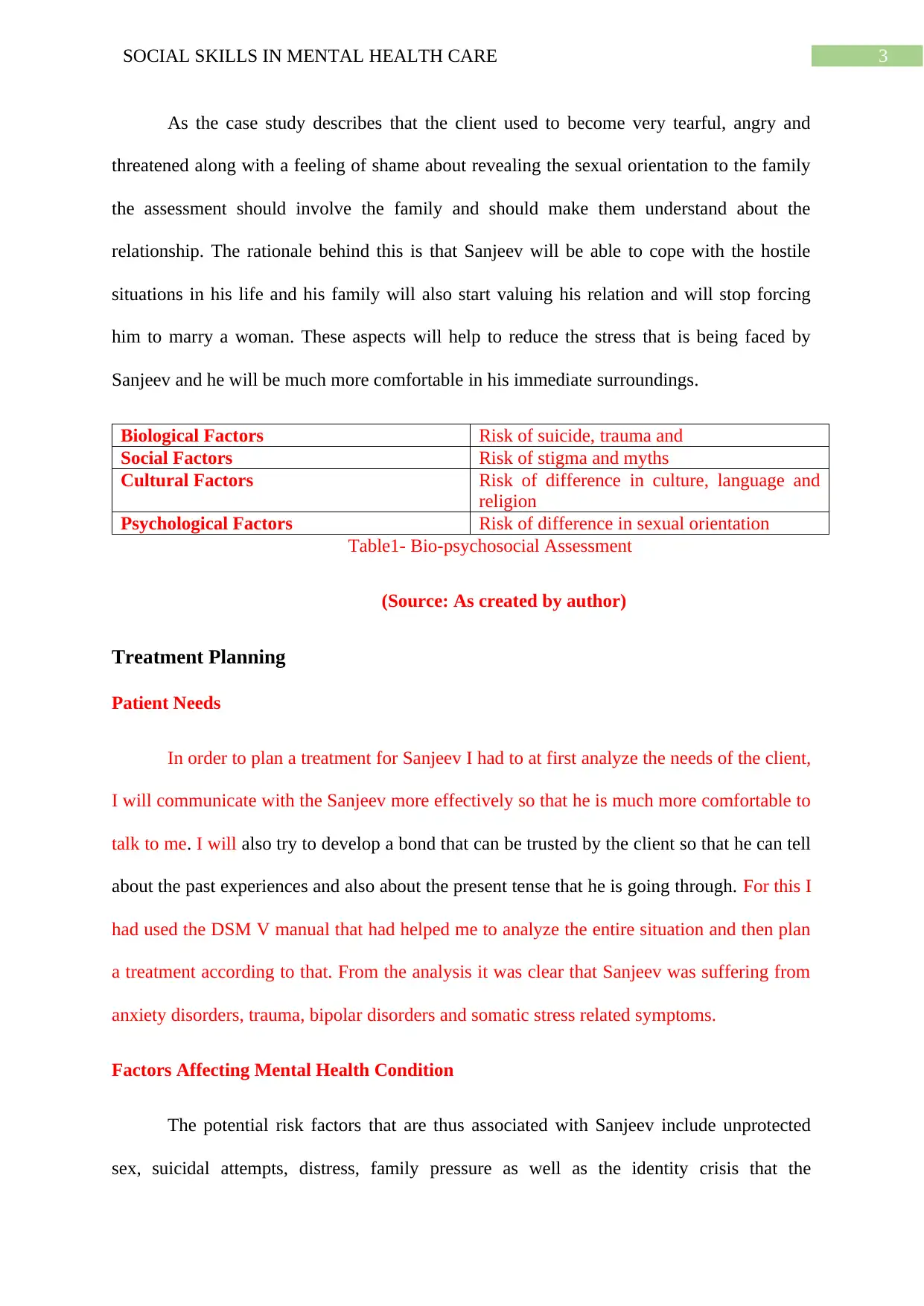
3SOCIAL SKILLS IN MENTAL HEALTH CARE
As the case study describes that the client used to become very tearful, angry and
threatened along with a feeling of shame about revealing the sexual orientation to the family
the assessment should involve the family and should make them understand about the
relationship. The rationale behind this is that Sanjeev will be able to cope with the hostile
situations in his life and his family will also start valuing his relation and will stop forcing
him to marry a woman. These aspects will help to reduce the stress that is being faced by
Sanjeev and he will be much more comfortable in his immediate surroundings.
Biological Factors Risk of suicide, trauma and
Social Factors Risk of stigma and myths
Cultural Factors Risk of difference in culture, language and
religion
Psychological Factors Risk of difference in sexual orientation
Table1- Bio-psychosocial Assessment
(Source: As created by author)
Treatment Planning
Patient Needs
In order to plan a treatment for Sanjeev I had to at first analyze the needs of the client,
I will communicate with the Sanjeev more effectively so that he is much more comfortable to
talk to me. I will also try to develop a bond that can be trusted by the client so that he can tell
about the past experiences and also about the present tense that he is going through. For this I
had used the DSM V manual that had helped me to analyze the entire situation and then plan
a treatment according to that. From the analysis it was clear that Sanjeev was suffering from
anxiety disorders, trauma, bipolar disorders and somatic stress related symptoms.
Factors Affecting Mental Health Condition
The potential risk factors that are thus associated with Sanjeev include unprotected
sex, suicidal attempts, distress, family pressure as well as the identity crisis that the
As the case study describes that the client used to become very tearful, angry and
threatened along with a feeling of shame about revealing the sexual orientation to the family
the assessment should involve the family and should make them understand about the
relationship. The rationale behind this is that Sanjeev will be able to cope with the hostile
situations in his life and his family will also start valuing his relation and will stop forcing
him to marry a woman. These aspects will help to reduce the stress that is being faced by
Sanjeev and he will be much more comfortable in his immediate surroundings.
Biological Factors Risk of suicide, trauma and
Social Factors Risk of stigma and myths
Cultural Factors Risk of difference in culture, language and
religion
Psychological Factors Risk of difference in sexual orientation
Table1- Bio-psychosocial Assessment
(Source: As created by author)
Treatment Planning
Patient Needs
In order to plan a treatment for Sanjeev I had to at first analyze the needs of the client,
I will communicate with the Sanjeev more effectively so that he is much more comfortable to
talk to me. I will also try to develop a bond that can be trusted by the client so that he can tell
about the past experiences and also about the present tense that he is going through. For this I
had used the DSM V manual that had helped me to analyze the entire situation and then plan
a treatment according to that. From the analysis it was clear that Sanjeev was suffering from
anxiety disorders, trauma, bipolar disorders and somatic stress related symptoms.
Factors Affecting Mental Health Condition
The potential risk factors that are thus associated with Sanjeev include unprotected
sex, suicidal attempts, distress, family pressure as well as the identity crisis that the
Paraphrase This Document
Need a fresh take? Get an instant paraphrase of this document with our AI Paraphraser
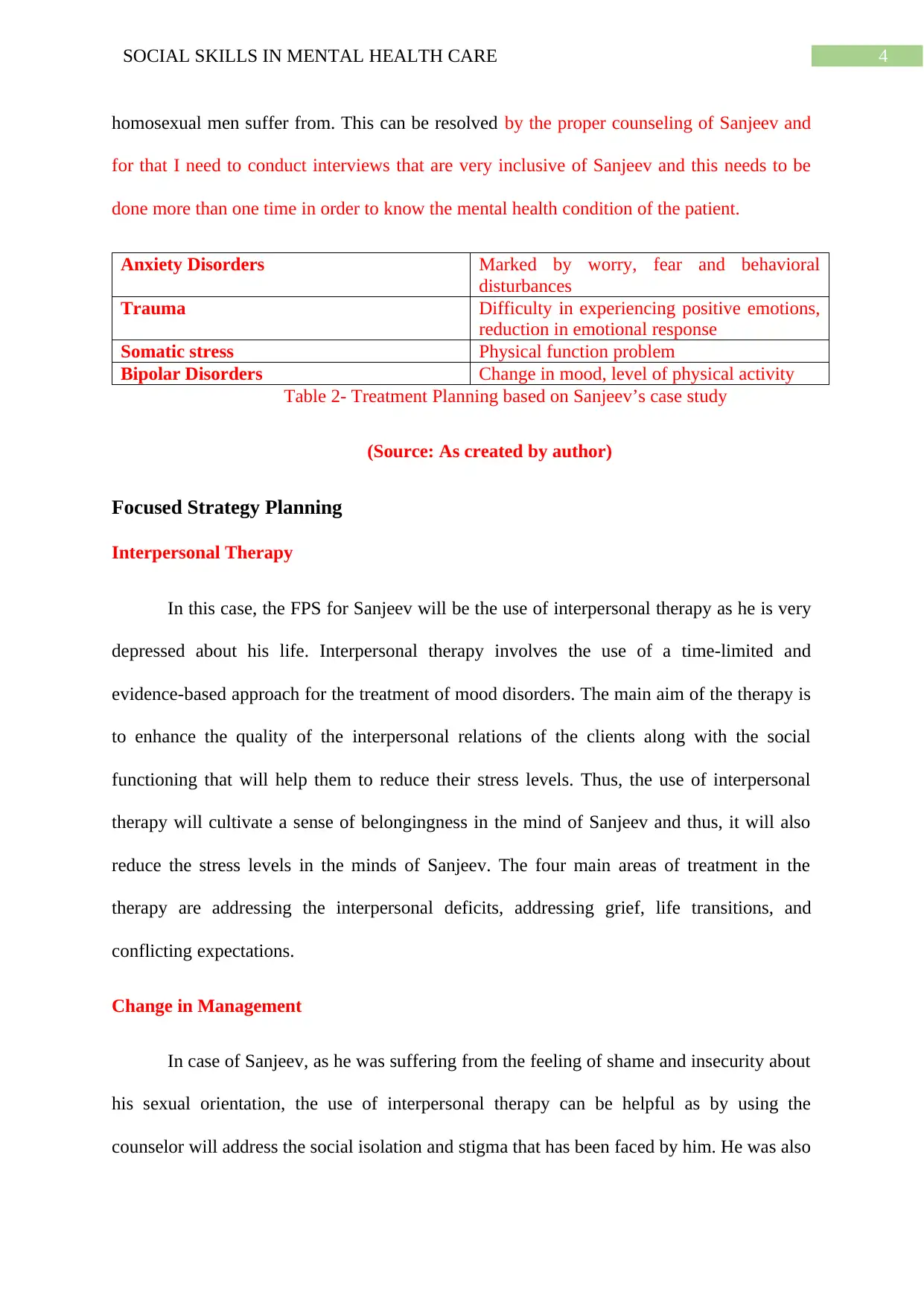
4SOCIAL SKILLS IN MENTAL HEALTH CARE
homosexual men suffer from. This can be resolved by the proper counseling of Sanjeev and
for that I need to conduct interviews that are very inclusive of Sanjeev and this needs to be
done more than one time in order to know the mental health condition of the patient.
Anxiety Disorders Marked by worry, fear and behavioral
disturbances
Trauma Difficulty in experiencing positive emotions,
reduction in emotional response
Somatic stress Physical function problem
Bipolar Disorders Change in mood, level of physical activity
Table 2- Treatment Planning based on Sanjeev’s case study
(Source: As created by author)
Focused Strategy Planning
Interpersonal Therapy
In this case, the FPS for Sanjeev will be the use of interpersonal therapy as he is very
depressed about his life. Interpersonal therapy involves the use of a time-limited and
evidence-based approach for the treatment of mood disorders. The main aim of the therapy is
to enhance the quality of the interpersonal relations of the clients along with the social
functioning that will help them to reduce their stress levels. Thus, the use of interpersonal
therapy will cultivate a sense of belongingness in the mind of Sanjeev and thus, it will also
reduce the stress levels in the minds of Sanjeev. The four main areas of treatment in the
therapy are addressing the interpersonal deficits, addressing grief, life transitions, and
conflicting expectations.
Change in Management
In case of Sanjeev, as he was suffering from the feeling of shame and insecurity about
his sexual orientation, the use of interpersonal therapy can be helpful as by using the
counselor will address the social isolation and stigma that has been faced by him. He was also
homosexual men suffer from. This can be resolved by the proper counseling of Sanjeev and
for that I need to conduct interviews that are very inclusive of Sanjeev and this needs to be
done more than one time in order to know the mental health condition of the patient.
Anxiety Disorders Marked by worry, fear and behavioral
disturbances
Trauma Difficulty in experiencing positive emotions,
reduction in emotional response
Somatic stress Physical function problem
Bipolar Disorders Change in mood, level of physical activity
Table 2- Treatment Planning based on Sanjeev’s case study
(Source: As created by author)
Focused Strategy Planning
Interpersonal Therapy
In this case, the FPS for Sanjeev will be the use of interpersonal therapy as he is very
depressed about his life. Interpersonal therapy involves the use of a time-limited and
evidence-based approach for the treatment of mood disorders. The main aim of the therapy is
to enhance the quality of the interpersonal relations of the clients along with the social
functioning that will help them to reduce their stress levels. Thus, the use of interpersonal
therapy will cultivate a sense of belongingness in the mind of Sanjeev and thus, it will also
reduce the stress levels in the minds of Sanjeev. The four main areas of treatment in the
therapy are addressing the interpersonal deficits, addressing grief, life transitions, and
conflicting expectations.
Change in Management
In case of Sanjeev, as he was suffering from the feeling of shame and insecurity about
his sexual orientation, the use of interpersonal therapy can be helpful as by using the
counselor will address the social isolation and stigma that has been faced by him. He was also
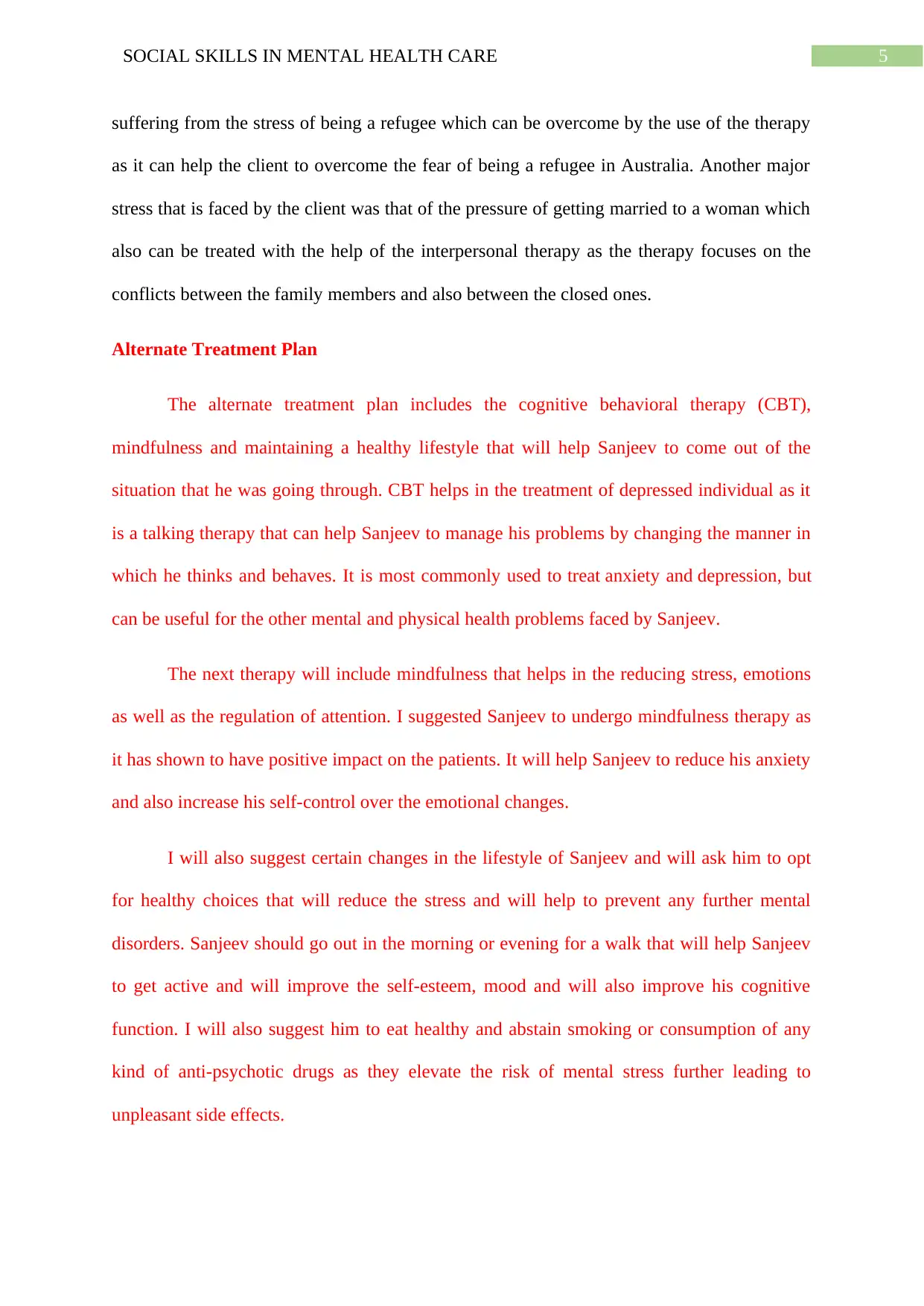
5SOCIAL SKILLS IN MENTAL HEALTH CARE
suffering from the stress of being a refugee which can be overcome by the use of the therapy
as it can help the client to overcome the fear of being a refugee in Australia. Another major
stress that is faced by the client was that of the pressure of getting married to a woman which
also can be treated with the help of the interpersonal therapy as the therapy focuses on the
conflicts between the family members and also between the closed ones.
Alternate Treatment Plan
The alternate treatment plan includes the cognitive behavioral therapy (CBT),
mindfulness and maintaining a healthy lifestyle that will help Sanjeev to come out of the
situation that he was going through. CBT helps in the treatment of depressed individual as it
is a talking therapy that can help Sanjeev to manage his problems by changing the manner in
which he thinks and behaves. It is most commonly used to treat anxiety and depression, but
can be useful for the other mental and physical health problems faced by Sanjeev.
The next therapy will include mindfulness that helps in the reducing stress, emotions
as well as the regulation of attention. I suggested Sanjeev to undergo mindfulness therapy as
it has shown to have positive impact on the patients. It will help Sanjeev to reduce his anxiety
and also increase his self-control over the emotional changes.
I will also suggest certain changes in the lifestyle of Sanjeev and will ask him to opt
for healthy choices that will reduce the stress and will help to prevent any further mental
disorders. Sanjeev should go out in the morning or evening for a walk that will help Sanjeev
to get active and will improve the self-esteem, mood and will also improve his cognitive
function. I will also suggest him to eat healthy and abstain smoking or consumption of any
kind of anti-psychotic drugs as they elevate the risk of mental stress further leading to
unpleasant side effects.
suffering from the stress of being a refugee which can be overcome by the use of the therapy
as it can help the client to overcome the fear of being a refugee in Australia. Another major
stress that is faced by the client was that of the pressure of getting married to a woman which
also can be treated with the help of the interpersonal therapy as the therapy focuses on the
conflicts between the family members and also between the closed ones.
Alternate Treatment Plan
The alternate treatment plan includes the cognitive behavioral therapy (CBT),
mindfulness and maintaining a healthy lifestyle that will help Sanjeev to come out of the
situation that he was going through. CBT helps in the treatment of depressed individual as it
is a talking therapy that can help Sanjeev to manage his problems by changing the manner in
which he thinks and behaves. It is most commonly used to treat anxiety and depression, but
can be useful for the other mental and physical health problems faced by Sanjeev.
The next therapy will include mindfulness that helps in the reducing stress, emotions
as well as the regulation of attention. I suggested Sanjeev to undergo mindfulness therapy as
it has shown to have positive impact on the patients. It will help Sanjeev to reduce his anxiety
and also increase his self-control over the emotional changes.
I will also suggest certain changes in the lifestyle of Sanjeev and will ask him to opt
for healthy choices that will reduce the stress and will help to prevent any further mental
disorders. Sanjeev should go out in the morning or evening for a walk that will help Sanjeev
to get active and will improve the self-esteem, mood and will also improve his cognitive
function. I will also suggest him to eat healthy and abstain smoking or consumption of any
kind of anti-psychotic drugs as they elevate the risk of mental stress further leading to
unpleasant side effects.
⊘ This is a preview!⊘
Do you want full access?
Subscribe today to unlock all pages.

Trusted by 1+ million students worldwide
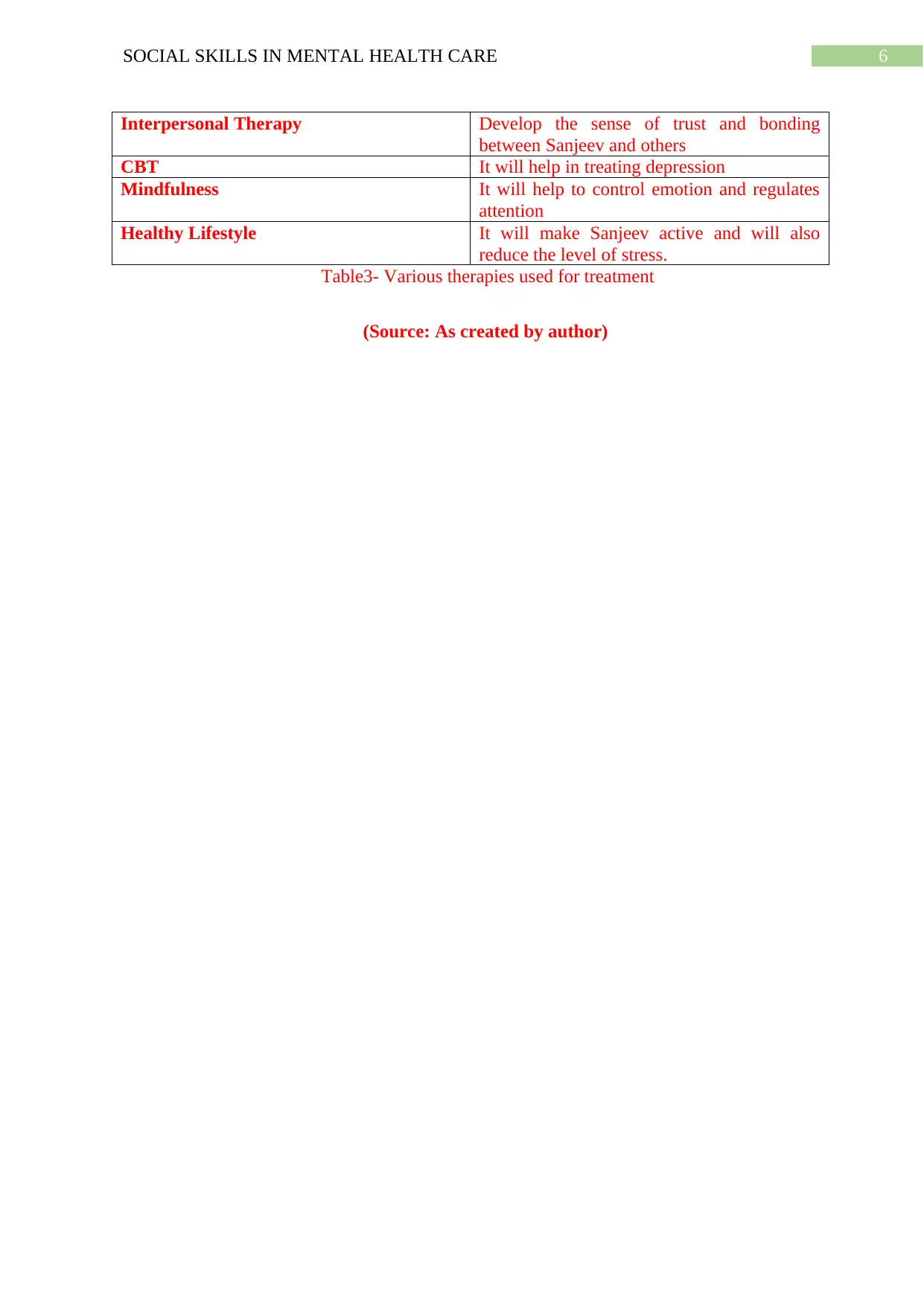
6SOCIAL SKILLS IN MENTAL HEALTH CARE
Interpersonal Therapy Develop the sense of trust and bonding
between Sanjeev and others
CBT It will help in treating depression
Mindfulness It will help to control emotion and regulates
attention
Healthy Lifestyle It will make Sanjeev active and will also
reduce the level of stress.
Table3- Various therapies used for treatment
(Source: As created by author)
Interpersonal Therapy Develop the sense of trust and bonding
between Sanjeev and others
CBT It will help in treating depression
Mindfulness It will help to control emotion and regulates
attention
Healthy Lifestyle It will make Sanjeev active and will also
reduce the level of stress.
Table3- Various therapies used for treatment
(Source: As created by author)
Paraphrase This Document
Need a fresh take? Get an instant paraphrase of this document with our AI Paraphraser

7SOCIAL SKILLS IN MENTAL HEALTH CARE
1 out of 8
Related Documents
Your All-in-One AI-Powered Toolkit for Academic Success.
+13062052269
info@desklib.com
Available 24*7 on WhatsApp / Email
![[object Object]](/_next/static/media/star-bottom.7253800d.svg)
Unlock your academic potential
Copyright © 2020–2026 A2Z Services. All Rights Reserved. Developed and managed by ZUCOL.





